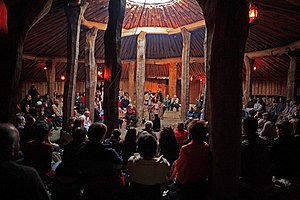敘事學
敘事學(粵拼:zeoi6 si6 hok6;英文:narratology)係一個專門研究故仔-嘅人文社會科學領域:人文社科研究人類嘅文化同社會,而故仔呢樣嘢喺人類文化當中無處不在,好多嘅文化產物-包括用嚟傳承先人智慧嘅口傳故仔、好多嘅文學作品、漫畫、電影、同好多嘅舞台藝術(例如大戲同芭蕾舞噉)-當中都有故仔喺入面,所以故仔嘅元素同結構以及「人類點樣傳達故仔」等課題對於了解人類文化以至社會嚟講相當重要[1]。

敘事學正正就係研究呢啲問題嘅一個領域。敘事學家會由文學同電影等嘅文化產物嗰度觀察人類作嘅故仔,並且嘗試搵出故仔當中存在嘅普遍規律(好似係對橋段嘅學術思考[2])同諗吓呢啲規律對了解人類嚟講俾到乜嘢啟示[1]。
基本定義
編輯敘事學研究故仔,所以首先要對「故仔」呢個詞有明確嘅定義。一般嚟講,故仔喺敘事學上係指一連串彼此之間有關連嘅事件,「故仔」指嘅係啲事件本身,而唔係表達串事件嘅媒介-一串用嚟講故仔嘅文字同個故仔本身係兩樣嘢[3]。
| 「 | 原版英文:"Narrative is a perceived sequence of non-randomly connected events, typically involving, as the experiencing agonist, humans or quasi-humans, or other sentient beings, from whose experience we human can learn."
粵文翻譯:敘事體係被(讀者觀眾)感知到嘅連串非隨機嘅相關事件,通常包括人類、類似人類嘅生物、或者第啲有感覺嘅存在作為經驗(啲事件)嘅主動體,而我哋人類能夠由呢啲經驗當中學習。 |
」 |
連串性(sequentiality)同事件之間嘅關連性(connectedness)一般俾敘事學界認為係故仔必要有嘅性質:想像一串文字,敘述咗一柞事件,柞事件彼此之間有關連、但完全唔知邊件先邊件後(缺乏連串性),讀者唔會能夠慢慢噉感受事態發展或者變化;而如果有一串文字,敘述一柞有明顯先後,但彼此之間完全冇因果關係、唔啦更嘅事件(缺乏關連性),讀者一樣會感受唔到事態發展或者變化-透過感知一柞事件嚟想像事態發展或者變化係故仔嘅核心特徵[4]。
睇埋
編輯參考文獻
編輯- Phelan, James. Experiencing Fiction: Judgments, Progressions, and the Rhetorical Theory of Narrative. Columbus: Ohio State University Press, 2007.
- Phelan, James. Living To Tell About It: A Rhetoric and Ethics of Character Narration. Ithaca: Cornell University Press, 2005.
- Phelan, James. Narrative as Rhetoric: Technique, Audiences, Ethics, Ideology. Columbus: Ohio State University Press, 1996.
- Phelan, James. Reading People, Reading Plots: Character, Progression, and the Interpretation of Narrative. Chicago: University of Chicago Press, 1989.
- Phelan, James, ed. Reading Narrative: Form, Ethics, Ideology. Columbus: Ohio State University Press, 1989.
- Phelan, James, David Herman, and Brian McHale, eds. Teaching Narrative Theory. New York: MLA Publications, 2010.
- Phelan, James, and Peter J. Rabinowitz. A Companion to Narrative Theory. Malden: Blackwell, 2005.
- Phelan, James, and Peter J. Rabinowitz. Understanding Narrative. Columbus: Ohio State University Press, 1994.
攷
編輯- ↑ 1.0 1.1 Prince, G. (2003). A dictionary of narratology. U of Nebraska Press.
- ↑ Carnell, R. (2014). Eliza Haywood and the Narratological Tropes of Secret History. Journal for Early Modern Cultural Studies, 14(4), 101-121.
- ↑ 3.0 3.1 Toolan, M. (2001). Narrative: A Critical Linguistic Introduction. Interface. London: Routledge. p. 2.
- ↑ Sternberg, M., 2010. Narrativity: from objectivist to functional paradigm. Poetics Today, 31, 507–659.
拎
編輯- "Musical Narratology" by William Echard, review of A Theory of Musical Semiotics by Eero Tarasti, foreword by Thomas A. Sebeok.
- The Narrative Act: Wittgenstein and Narratology by Henry McDonald.
- Story-Systems.
- Narrative theory bibliography (A Bibliography of Literary Theory, Criticism and Philology).
- Narratology: A Guide to the Theory of Narrative by Manfred Jahn.
- Five Analyses of the Narrative "I First Got Paid".
- The Living Handbook of Narratology.
- Narratology: The Study of Story Structure.